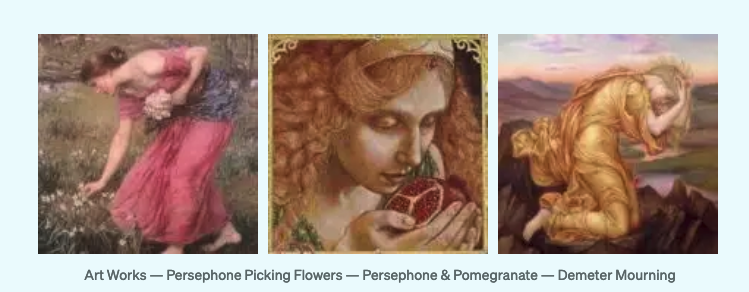Mother/Daughter Pair Persephone and Demeter
written by Anne SkyvingtonJanuary 4, 2023

Why This Is My Chosen One
In a way, this myth chose me. And that’s what myths are meant to do. I’ve always been aware — at least during my writing life — that this myth typifies something about my life.
Polarities
Persephone and her mother, Demeter, represent for me a prime example of polarities that characterize members of certain families, especially the offspring of opposite parents. Persephone is the epitome of “the golden child”, a spirited, trusting child, who likes nothing better than to roam in nature, picking flowers for her mother. The mother, Demeter, on the other hand, is an agricultural goddess of the earth, with a powerful role in relation to the underworld, and to air and to water. It is not surprising that their relationship is compromised by circumstances, as they are at different stages of life and appear to be polar opposites.
The Spiritual Dimension
Although Demeter was looked upon as a Goddess in ancient times, she was also depicted with snake-like tresses and a dark side. Persephone is the loved and loving daughter, who will experience the dark side in order to grow. As a couple, they are the archetypal mother/daughter couple in all its complexities. Many of us experience conflict with parent figures as we move towards puberty.
My Relationship with the Myth
I was born into a family where the parents were split on many issues. I might have inherited more of my father’s traits, both physically and spiritually. This put me on a trajectory of conflict with my mother, who suffered from untreated narcissism and, possibly, undiagnosed “Attention Deficit Hyperactivity Disorder” (ADHD). In those days, the only diagnostic attempt a doctor made were with the words “a condition of the nerves”.
The Deeper Connections
As I grew into adulthood, I became determined to change. This would involve, for me, utilizing psychotherapy, a field that was growing in importance and in popularity during these years. It is not surprising that I gravitated towards post-Freudian psychoanalysis in the sixties, since it focused on childhood issues for healing. I had a strong intuitive bent, and I knew that emotional problems left over from childhood, were at the base of my adult depression.
Intuition and Spirituality
The other aspect of my journey was a sense of knowing the importance of “wholeness”, which is what led me to Gestalt Therapies, and, ultimately to Carl Jung and his special brand of psychoanalysis, which he named Analytical Psychology. I knew then that I had to accept the dark, shadow side of myself, as well as the lighter side, which I was trying to locate and access.
Descent into the Subterranean Field
Persephone was abducted by the King of the Underworld, who wanted her as his wife. Demeter, after falling into a terrible depression on losing her daughter, finally managed to win her back, at least for half of each year. This is a myth that points to the genesis of the seasons, but it also has ramifications for life in general.
The Ultimate Implication
Change and transformation can only come about if one is prepared to take risks and confront the void. Persephone represents the descent into the underworld, which she is compelled by destiny to do. Demeter belongs to the world above, but she is confronted with shocks and threats that she must come to terms with. Together they form a unit, like that of the archetypal mother/daughter role in society today.
Choose Your Favorite Myth
It’s worth asking what your favourite myth is.
What does it say about change and transformation??What is a possible metaphorical meaning for Persephone’s abduction?What is an archetype?What is the personal connection for the author?Why does the author see this as a spiritual topic still relevant today?





Leave A Comment